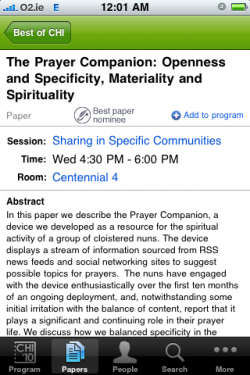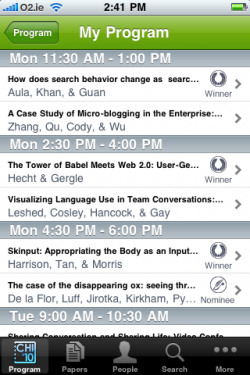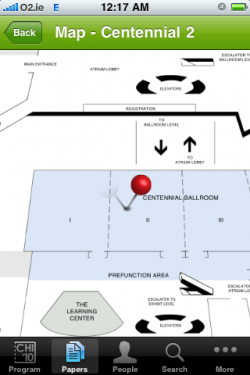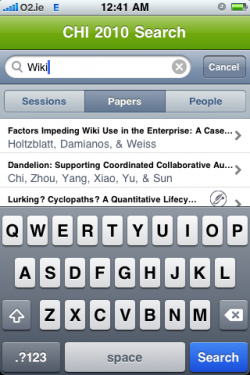EPUB is just HTML + CSS in a tasty ZIP package. Let’s have more of it!
That’s the message of this 3 minute spiel I gave David Weinberger when he interviewed me at LOD-LAM back in June. Resulting video is on YouTube and below.
EPUB is just HTML + CSS in a tasty ZIP package. Let’s have more of it!
That’s the message of this 3 minute spiel I gave David Weinberger when he interviewed me at LOD-LAM back in June. Resulting video is on YouTube and below.
Tags: ePub, LODLAM, videos
Posted in books and reading, future of publishing, information ecosystem, library and information science | Comments (0)
We’ve extended the STLR 2011 deadline due to several requests; submissions are now due May 8th.
JCDL workshops are split over two half-days, and we are lucky enough to have *two* keynote speakers: Bernhard Haslhofer of the University of Vienna and Cathy Marshall of Microsoft Research.
Consider submitting!
STLR 2011
June 16 (PM) & 17 (AM) 2011
http://stlr2011.weebly.com/
Co-located with the ACM/IEEE Joint Conference on Digital Libraries (JCDL) 2011 Ottawa, Canada
While Semantic Web technologies are successfully being applied to library catalogs and digital libraries, the semantic enhancement of books and other electronic media is ripe for further exploration. Connections between envisioned and emerging scholarly objects (which are doubtless social and semantic) and the digital libraries in which these items will be housed, encountered, and explored have yet to be made and implemented. Likewise, mobile reading brings new opportunities for personalized, context-aware interactions between reader and material, enriched by information such as location, time of day and access history.
This full-day workshop, motivated by the idea that reading is mobile, interactive, social, and material, will be focused on semantically enhancing electronic media as well as on the mobile and social aspects of the Semantic Web for electronic media, libraries and their users. It aims to bring together practitioners and developers involved in semantically enhancing electronic media (including documents, books, research objects, multimedia materials and digital libraries) as well as academics researching more formal aspects of the interactions between such resources and their users. We also particularly invite entrepreneurs and developers interested in enhancing electronic media using Semantic Web technologies with a user-centered approach.
We invite the submission of papers, demonstrations and posters which describe implementations or original research that are related (but are not limited) to the following areas of interest:
*EXTENDED* Paper submission deadline: May 8th 2011
Acceptance notification: June 1st 2011
Camera-ready version: June 8th 2011
Each submission will be independently reviewed by 2-3 program committee members.
Please use PDF format for all submissions. Semantically annotated versions of submissions, and submissions in novel digital formats, are encouraged and will be accepted in addition to a PDF version.
All submissions must adhere to the following page limits:
Full length papers: maximum 8 pages
Demonstrations: 2 pages
Posters: 1 page
Use the ACM template for formatting: http://www.acm.org/sigs/pubs/proceed/template.html
Submit using EasyChair: https://www.easychair.org/conferences/?conf=stlr2011
Tags: annotation, CFP, context-aware, ebooks, electronic media, ePub, JCDL2011, LLD, location-based storytelling, multimedia collections, recommendations, semantic libraries, STLR2011, workshops
Posted in future of publishing, library and information science, PhD diary, scholarly communication, semantic web, social semantic web | Comments (2)
A post at HLit got me thinking about locative hypertexts, which are meant to be read in a particular place.
Monday, Liza Daly shared an epub demo which pulls in the reader’s location, and makes decisions about the character’s actions based on movement. Think of it as a choose-your-own-adventure novel crossed with a geo-aware travel guide. It’s a brief proof-of-concept, and the most exciting part is that the code is free for the taking under the very permissive (GPL + commercial-compatible) MIT License. Thanks, Liza and Threepress for lowering barriers to experimentation with ebooks!
‘Locative hypertexts’ also bring to mind GPS-based guidebooks as envisioned in the 2007 Editus video ‘Possible ou probable…?’ ((Editus’ copy of the video)):
Tim McCormick summarizes:
In the 9-minute video, we get mouth-watering, partly tongue-in-cheek scenes of continental Europe’s quality-of-life — fantastic trains & pedestrian streetscapes,independent bookstores, delicious food, world-class museums, weekend getaway to Bruges, etc.– as the movie follows a couple through a riotous few days of E-book high living.
On their fabulously svelte, Kindle 2-like devices, they
- read and purchase novels
- enjoy reading on the beach
- get multimedia museum guides
- navigate foreign cities with ease
- stay in multimedia contact with friends and family
- collaborate with colleagues on shared virtual desktops while at sidewalk cafes
- see many hi-resolution Breughel paintings online and off that I’m dying to see myself
etc.
Multimedia guidebooks ((e.g. the Lonely Planet city guide series for iPhone)) are approaching this vision. Combine them with (also-existing) turn-by-turn directions, and connectivity and privacy will be the largest remaining obstacles.
So then what about location-based storytelling? I got to thinking about the iPhone apps I’ve already encountered, which are intended for use in particular places:
Tags: ePub, hypertext, interactivity, location-based storytelling
Posted in books and reading, future of publishing, information ecosystem, iOS: iPad, iPhone, etc. | Comments (0)
via Gene Golovchinsky, I learned of an iphone app for CHI2010. What a great way to amplify the conference! Thanks to Justin Weisz and the rest of the CMU crew.
I was happy to browse the proceedings while lounging. The papers I mark show up in my personal schedule and in a reading list.


I think it’s an attractive alternative to making a paper list by hand, using some conferences’ clunky online scheduling tool, or circling events in large conference handouts. If you keep an iPhone/iPod in your pocket, the app could be used during the conference, but I might also want to print out my sessions on an index card. So exporting the list would be a good enhancement: in addition to printing, I’d like to send the list of readings directly to Zotero (or another bibliographic manager).
The advance program embedded on the conference website still has some advantages: it’s easier to find out more about session types (e.g. alt.chi). Courses and workshops stand out online, too.


Wayfinding is hard in on-screen PDFs, so I hope that in the long run scholarly proceedings become more screen-friendly. While at present I find an iPhone appealing for reading fiction, on-screen scholarly reading is harder: for one thing, it’s not linear.
I’d like to see integrated, reader-friendly environments for conference proceedings, with full-text papers. I envision moving seamlessly between the proceedings and an offline reading environment. Publishers can already support offline reading on a wide variety of smartphones: the HTML5-based Ibis Reader uses ePub, a standard based on xHTML and CSS. There’s no getting around the download step, but an integrated environment can be “download first, choose later”. I’ve never had much luck with CD-ROM and USB-based conference proceedings, except in pulling off 2-3 PDFs of papers to read later.
Tags: amplification, CHI2010, ePub, HTML5, ibisreader
Posted in future of publishing, information ecosystem, iOS: iPad, iPhone, etc., scholarly communication | Comments (0)